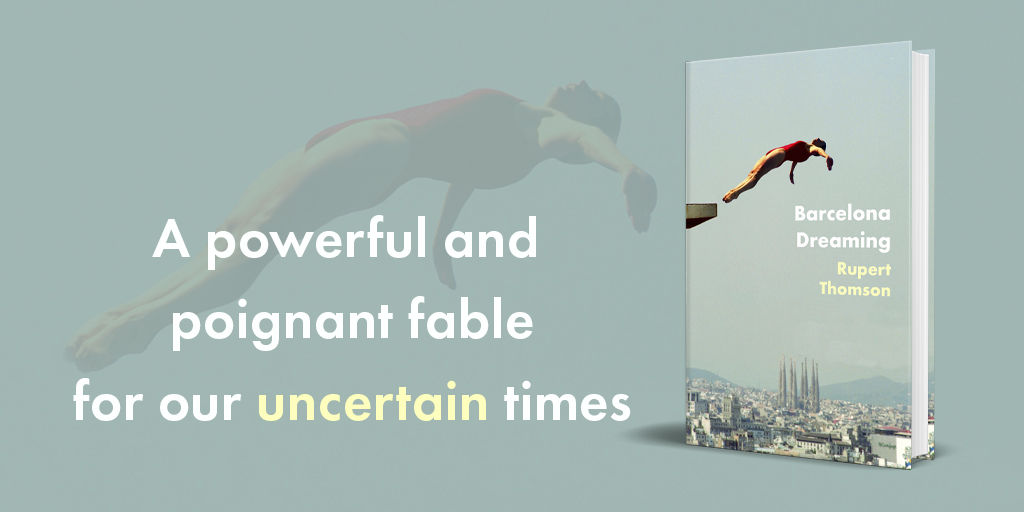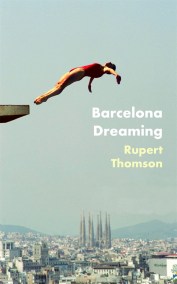Read an extract from Barcelona Dreaming

When I was twenty-one, I fell in love with Pol. I moved to Barcelona to be close to him, and we married soon after. Within a year of our wedding I was pregnant, but things had already started to go wrong between us, and by the time our daughter was six months old we had split up and were living apart. Though I was from the North of England, I stayed on in Barcelona. I couldn’t bear to leave. The quality of the light first thing in the morning, so bright and clear that the buildings seemed to have black edges. The green parrots that f lashed from one palm tree to another. Long walks in the Collserola in April, to gather wild asparagus, or in September, to hunt for mushrooms. The beach every weekend in the summer, the mountains in the winter — and restaurants and bars that stayed open all night. It was a city whose pleasures were simple and constant—and it was a good place to raise a child.
For the first few years, I taught at an international school in Pedralbes, but I’d always dreamed of running a business of my own. It wasn’t until my daughter, Mar, was in her early teens that I had the money—I came into a small inheritance— and not long afterwards I found a commercial property that I thought might work: two rooms and a backyard in Sarrià, an ancient, well-heeled area in the upper reaches of the city. I called the shop Trinket. The cheekiness of the word appealed to me. Though English, it had a Catalan ring to it. That abruptness at the end. The sudden, final consonant. When I first saw the name printed in gold script on the crimson banner that would hang outside, it perfectly described the kind of place I’d had in mind—an Aladdin’s cave of unexpected and exotic treasures.
Mar decided to go to university in England. She wanted to explore her English roots, she said. By then I’d been running Trinket for five years. I wasn’t making much of a profit, but I got by, and during her second year at Bristol I moved to a new apartment only a few minutes’ walk from the shop. Both the main bedroom and the living room had sliding glass doors that gave onto an east-facing terrace, where there was enough room for a Marquesa plant, a small lemon tree, and several pots of red geraniums. Directly beneath me was an underground car park, with frosted-glass slats high on the back wall that were left open all year-round. If I was sitting in my living room with no TV or music on, I would hear car engines starting, or people talking on their phones. Once, a man cleared his throat, and I thought for a moment that there was someone else in the apartment.
At first, this was all a bit unnerving. In time, though, I adjusted. Like the shudder of the fridge or the distant grinding of the lift, the noises even began to reassure me. I had been living there for about eighteen months when I was woken in the night by the sound of someone crying.
It seemed to be coming from below. I eased out of bed and stepped onto the terrace. It was a stifling, humid night in late July, and I could smell the jasmine that sprawled over the side wall of the building that stood opposite. Beneath it, as always in the summer, was the stale, slightly medieval smell of drains.
The crying was quieter now, and yet persistent, as if the misery ran deep. It sounded more like a man, I thought, than a woman. Back inside, I pulled on a denim skirt and a T-shirt, then I picked up my keys and left the apartment. When I reached the entrance to the car park, I felt a shiver of apprehension, but I shook it off and started down the concrete slope. At the bottom was a kind of cabin or kiosk. The man on duty most nights was a melancholy Venezuelan called Hector. He almost always brought his Alsatian, Rocky, to work with him. For companionship, he told me, rather than security. After all, Sarrià wasn’t exactly dangerous. I peered through the window. On the desk were a Styrofoam cup of coffee, still half-full, and a copy of Mundo Deportivo. There was no sign of Hector. Perhaps he had heard the crying himself, and had gone off to investigate. Or perhaps he had taken Rocky for a walk. There was a special sandy area for dogs about three hundred meters away, on the other side of Avinguda Foix.
I moved on, into the car park. The walls were dark blue to waist height and cream above, and the air smelled of spilled oil.
“Hello?” I called out. “Is anybody there?”
The stillness of the cars seemed temporary, as if they were living things, holding their breath. Some fifty yards away, there was another slope that dipped down to a lower level. I doubted I would have heard the crying if it had come from there.
Then, just as I was thinking of turning back, I saw him. He was bent over a Range Rover, his forearms resting on the bonnet, his face concealed. He looked young. Nineteen, perhaps. Or twenty. When I stopped nearby, he lifted his head and looked at me. His face was wet, though he was no longer crying.
I spoke to him in Spanish. “Are you all right?” Then I said the same thing again, in English.
Wiping his eyes on the inside of his wrist, he glanced beyond me warily, as if he suspected I might not be alone. He was wearing a dark-red short-sleeved shirt and a pair of jeans that looked new. Something told me he had made an effort that evening. He had dressed up to go out.
“Do you need help?” I asked.
He looked at me and spoke in French, his voice subdued, no more than a murmur. I had studied French at school, but it wasn’t a language I knew well. I had only a few basic phrases.
“Est-ce que je peux vous aider?”
He looked at his feet.
“Viens avec moi.” I took him gently by the arm and guided him back through the car park, towards the ramp that led up to the street. “Mon appartement,” I said. “Ce n’est pas loin.”
He muttered something I didn’t catch. Where was he from? North Africa, I thought. Probably Morocco. The city was full of Moroccans. People often complained there were too many.
On our way out, we passed the lighted kiosk, but Hector and Rocky hadn’t returned. I’d let go of the young man’s arm, and he was walking beside me. I noticed that he moved awkwardly. If he was in pain, though, he seemed determined not to show it.
As we reached the top of the slope, I remembered the French word for “hurt.” I turned to him and said, “Vous êtes blessé?” He threw me another wary look, then stared straight ahead. I chose not to pursue it.
Once we had rounded the corner, I pointed to my building. “Ici.”
I hadn’t yet worked out what I was going to do with him. I hadn’t thought that far ahead. I imagined he would sit at my kitchen table and drink—a glass of water or a cup of tea. It would be a quiet place, where he could recover. If he wanted to talk, I would listen. If not, I wouldn’t press him. Later, when he felt better, I would call him a taxi.
I opened the door to my apartment and he followed me, but he stopped just inside and stood with his back against the wall.
“It’s all right,” I said.
He asked where the bathroom was. I showed him. As he disappeared inside, I noticed a dark stain on the back of his jeans, as if he had sat on something wet.
The minutes passed, and he failed to emerge. I filled the electric kettle and switched it on. The clock on the oven said 2:47. When the kettle had boiled, I made a pot of mint tea and took it over to the table, then I fetched two cups, some brown sugar, and a spoon. There was still no sign of him. I went and knocked on the bathroom door.
“Ça va?” I said.
“Oui,” I heard him say. “Ça va.”
When he came out, we sat at the table and I poured the tea. He helped himself to two spoonfuls of sugar and stirred quickly, deftly, tapping the spoon twice on the rim of the cup before placing it back on the saucer. Without looking at me, he lifted the cup and blew across the top, ruffling the surface of the tea. He took a sip, then put the cup down. He performed each separate action with a kind of authority that made him seem both older and younger than he was. It was like watching a child pretending to be a grown-up, something I had often seen my daughter do. But these were clearly actions he had repeated so many times that they had become ingrained, and he appeared to find them consoling—they returned him to himself, perhaps — and it was only then that I began to wonder what he had been doing in a car park at two in the morning, and why he had been crying.
Once he had finished his tea, which he drank without saying a word—this silence also felt normal, learned—I asked how he was feeling. He nodded, but didn’t speak. I told him it was late. I had to work in the morning, and I needed sleep.
Rising from the table, he thanked me for the tea. I walked him out of my apartment and through the small lobby. On the street I gave him a twenty-euro note, which was all I had on me. For a taxi, I said. He took the money and stared at it. I asked if it was enough. Still looking at the money, he nodded again. I pointed along the street to the main road at the end. He could find a taxi on Avinguda Foix, I told him. They came down from the Ronda all the time.
“Vous pouvez me montrer,” he said.
He seemed insistent, and also commanding, and though I was tired it felt easier to do as he asked. We walked to the main road without talking. The narrow streets were deserted, with metal blinds lowered on most of the small businesses and shops. We saw no one.
As we approached Avinguda Foix, a taxi drifted towards us with its green light on. Relieved, I stuck out a hand. The taxi drew up next to me, and the young man opened the door and climbed in. When the driver saw I had stayed on the pavement, he glanced at the young man in his rearview mirror, though his words were directed at me.
“Has he got money?”
I said he had.
The young man looked at me through the half-open window.
“Merci.”
The taxi pulled away. Its taillights glowed briefly, then dimmed, as it dropped down the hill towards Diagonal. Now the road was quiet again, I felt guilty for having turned him away. Couldn’t I have offered him my sofa for the night? I walked back to my apartment, wondering if I had failed some kind of test.
The next morning, before opening my shop, I arranged to have coffee with my best friend, Montse. Montse was editor-in-chief at a small literary publishing house, and her husband, Jaume, taught at the university and wrote articles for El País and Letras Libres. I had met Montse in the nineties, at the gates of the international school Mar attended. One of Montse’s daughters was in the same class.
When I arrived at the café, she was sitting at a table under the trees in her Jackie O sunglasses and a green linen jacket. Her long brown hair was pinned up. I ordered a café con leche, then told her what had happened a few hours earlier.
“Fucking hell, darling,” she said. “You invited a total stranger into your apartment in the middle of the night?”
I was unable to keep from smiling. You could always rely on Montse for an extravagant reaction.
“I can’t believe you did that,” she went on.
“You wouldn’t have done it?”
“Are you kidding?”
“He was in trouble. He needed help.” Something made me want to go further, to widen the gap between us. “Actually, I think I could have done more.”
“You did plenty.” Montse shook a cigarette out of the packet on the table, lit it, and blew the smoke sideways, into the square. “What kind of trouble?”
“I don’t know. I didn’t ask.” I decided not to mention the wet patch on the back of the young man’s jeans. I’m not sure why. Perhaps I felt he wouldn’t want the information shared.
“Was he good-looking?”
“Montse,” I said, laughing.
“Well? Was he?”
“He was half my age.”
“You didn’t answer the question.”
I looked past her, at the facade of the town hall. Green shutters clattered open on the third floor of the building next door, and an elderly woman stood in the open window, her face raised to the sun.
“If you want to know the truth,” I said, “I’ve never seen anyone quite so beautiful.”
Lowering my eyes, I stared at the bright silver surface of the table, not because I was surprised or embarrassed by what I had just told Montse, but because it was the first time I’d put what I had felt into words. When I saw the young man leaning against the Range Rover, I had been struck by his physical grace — the slenderness of his forearm, the curve of his back under his shirt — and when he lifted his head and looked at me the breath had caught in my throat.
I looked up. Montse was still gazing at me, her mouth tilting in a kind of smile, her cigarette alight but temporarily forgotten between her fingers. Then she remembered it.
Seeing it had burned down to the filter, she gave a murmur of irritation and stabbed it into the ashtray.
“Well,” I said, “you asked.”
I was laughing again. You didn’t often see Montse at a loss for words.
Business was slow that day. Sometimes a whole hour went by without anybody walking into the shop. When I finished making an inventory of the stock that had just come in—soap manufactured in Menorca, Breton glassware, jewelry from Sulawesi — I began to rearrange the window display, but all I could see was the young man in the car park, in his shortsleeved shirt and his new jeans. I couldn’t imagine what his life had been like before I found him, or what it had been like since. Did he have family in Barcelona? Where did he live? What did he do for money?
That evening, when I got home, I called Xavi, a friend who was a sociology professor at the university. I asked about the Moroccan community, and he supplied me with some facts.
Of the twenty thousand Moroccans living in the city, he said, a quarter were probably undocumented. The figures were only rough estimates, since many of the people in question hadn’t applied for NIE numbers. They worked in the service industries, as dishwashers, office cleaners, and maids, or as fruit and vegetable pickers, or else they were involved in the black market.
You must have seen the young men on Las Ramblas at night, Xavi said, selling cans of beer to tourists or handing out fliers for restaurants and clubs. Like immigrants everywhere in Europe, they were responsible for more than their fair share of crime, but that was only to be expected. They felt marginalized, and were the object of racism and discrimination.
“Where do they live?” I asked.
“Some live downtown,” Xavi said, “in Ciutat Vell, Sants-Montjuïc, or the Raval. Others live in the northeast of the city—suburbs like Nou Barris or Sant Andreu.” He paused. “Why the sudden interest, Amy?”
“Oh,” I said, “no reason.”
The sound of the young man crying had woken me in the early hours of Thursday morning. The following Tuesday, when I came home from work, I found him waiting outside my building. Even though he was some distance away, I knew it was him. It was partly his body language, the way he was leaning against the wall, but he was also wearing the same shirt, the dark-red one with the short sleeves. Was it the only decent shirt he owned, or had he put it on deliberately, to make himself more recognizable? At that moment he turned his head my way and noticed me. He pushed away from the wall and crossed the road. He had a plastic carrier bag in one hand. When I reached him, he greeted me in Spanish.
“I didn’t know you spoke castellano,” I said.
He shrugged. “Only a little.”
I smiled. “I’m sure it’s better than my French.”
“No,” he said, remaining serious. “Your French is okay.”
Your French is okay. He hadn’t said my French was good, as most people would have done. That would have been a lie. I admired his candor. With someone like him, you might have a chance of knowing where you stood.
I asked him how he was feeling. Better, he said. He had been to a doctor, in the Raval.
“A doctor?” I said.
He looked past me, towards Major de Sarrià. Dusk was falling, the deep blue of the sky edging into black. I hadn’t been exaggerating about his loos — if anything, he was more beautiful than I remembered— and I felt something open or unfold inside me, like the speeded-up footage of a flower blooming. I hadn’t dared to hope I would have this feeling again in my life, and for a few moments I was fearful.
“Is he bothering you?”
I looked round. My neighbor, Senyor Artes, was standing in the entrance to the building. Next to him was the maroon two-wheeled Rolser he always took to the shops with him. Eulogio Faus Artes was in his late sixties, with a drinker’s swollen eyelids and gray hair that lay flat against his skull, and he lived on the ground floor, as I did, though his apartment was at the front, facing the street. He was a widower, and rarely had a good word to say about anything. In an attempt to stay on the right side of him, I spoke in Catalan whenever I saw him, Catalan he instantly corrected, even if there was nothing wrong with it, but in the eighteen months that I’d lived in the building he had already taken me to task on several occasions—for putting my rubbish out too early, for letting the door to my apartment slam, and also for playing music in the evenings. Eulogio, I thought. Never had a man been less aptly named.
“He’s not bothering me at all,” I said. “He’s a friend.”
“Friend.” Artes’s lips twisted, then he pushed past me and moved off along the pavement.
“I’m sorry about that,” I said, turning back to the young man. “My neighbor isn’t very pleasant.”
He gave a little shrug. “It’s normal.”
“It doesn’t make you angry?”
“Sometimes.” Then, all of a sudden, he looked me full in the face. “But you’re not like that.”
“I hope not,” I said.
He showed me the plastic bag he was holding. “I have come to cook for you.”
“You’ve come to cook for me?”
“Yes. To say thank you.”
“How lovely.” I took out the keys to my apartment.
“Please,” I said. “Come in.”







